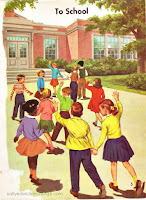Easy Logic Test to Determine Math Readiness
 |
| Sallyedelsteincollage.com |
There are two schools of thought in teaching young children:
"Better Early Than Late" and "Better Late Than Early." I fall into both camps.
I agree with all those people who see that their
preschoolers can memorize anything, and believe you should take this window
(that closes around age 7 or 8) to help your child memorize Bible verses, the
times tables, helping verbs, and other pertinent life facts.
At age four, my son (like your child) was memorizing a favorite
video. When my husband was aged 4-8 he
inadvertently memorized commercials (and can win all jingle contests at
parties). When I was that age we went to
church three times a week, and so without trying to, I memorized hymns (for
which I am forever grateful!).
But I didn't want my son memorizing The Three Little Pigs
video! So we began Classical
Conversations, and I'm glad we did. He
(we) learned a lot. Their timeline song
is amazing! It has been so helpful in our school work. Beginning CC with your 4-6 year old is an
example of Better Early than Late. So is
teaching them to read and write, do skip counting or memorize addition,
subtraction, or multiplication songs.
One homeschool company is very vocal in saying it is
ridiculous to memorize when the child doesn't know what it means, but I
disagree. We learn many things by rote
before we can understand what they mean.
Bible verses, theology, nursery rhymes, the states, hymns, abc's,
helping verbs, the Preamble to the Constitution, the Bill of Rights. I had to memorize the Preamble and Bill of
Rights in middle school, but had no idea what they really meant. Thank you "School House Rock" for
your grammar and history songs! I may
have failed 7th grade without you.
 |
| Sallyedelsteincollage.com |
The idea of Better Early Than Late is to learn as much as
you can while the window of easy memorization that God gave our brains to learn
language is open. Missionaries who took
their children to a foreign country discovered the ability of their children to
learn the native language easily. Maria
Montessori recognized the value of Better Early Than Late training 100 years
ago when poor city women left their pre-school aged children with her, thus
beginning our preschools. And it is a
great idea.
YET, there is a really good reason that the majority of
states do not require Kindergarten. Six
is usually the legal age to begin school.
150 years ago the age was 7.
These people realized that children forget what they learn (unless truly
memorized and gone over often, such as favorite songs, or the abc's), and that
you are constantly re-teaching a child and it takes a long time for them to
grasp a concept. This is very true. So these people say do not teach language or
math concepts to a child before second, third, or fourth grade, depending on
the child. And they are correct. Why take a month to teach a concept, when
you wait a year and it takes two weeks, or wait two years and it takes one
week, or wait three years and they understand in only a day's lesson? These are the Better Late Than Early
proponents.
Go ahead and teach your child what he is naturally learning,
memorizing, grasping, wanting to know, and the "grammar" of things
(such as abcs, math facts without concepts, possibly how to read, the songs
about nouns, verbs, adjectives, etc.), just don't expect him to be able to USE
the facts yet.
Why pull out your hair with explanations that their brains
cannot yet grasp? That is how God made
their brains....THEY HAVEN'T REACHED THE LOGIC STAGE yet! So no amount of teaching or review will
help. They will be frustrated and think
they are stupid, and you will be frustrated and stupid, too, for trying to
force the impossible.
Schools took the guidelines given to them by people who
studied how children learned and said, "Well, if they are ready at eight,
let's just give them a preview of adjectives, nouns, conjugations, geometry,
and algebra now to prepare them."
They totally didn't get that the child's brain IS NOT READY to learn
these things. The introduction of these
concepts make our children CRY over their math and reading and spelling and
geography and language arts. A few
children (especially older kids and girls) in the class do well, and so that
becomes the norm.
Is your child crying over a subject? You need to STOP that subject. Or he will feel like a failure at it his
whole life. People often say they
aren't good at math. But, if as adults,
they retake math (especially while homeschooling their own kids), they discover
that they CAN do it after all. It was
simply a case of not being ready....not being "stupid."
So here is the super simple logic test that schools
were given decades ago that they never implemented, but which has been passed
on in homeschool books since the 1960's:
You only need 4 things:
- Your child's favorite drink
- A short, fat glass
- A tall, skinny glass
- A measuring cup
Pour the soda/juice into the measuring cup and tell him
"I am measuring 4 ounces, see?"
Then pour it into the short, fat glass.
Show him you are measuring another 4 ounces and pour it into the tall,
skinny glass.
Then ask him which glass he wants.
When my son was six, he said he wanted the tall, skinny
glass.
"Why?"
"Because it has more in it."
End of experiment. My child has NOT reached the logic stage and teaching him math is a waste of my time, or the teacher's time, or the remedial teacher's time, and especially, of my child's time. It is physically
impossible for him to "get it."
One day he will remember that 1 + 2 = 3, but the next day he won't
understand that 2 + 1 = 3. Because he doesn't get it. He can't.
His brain isn't there yet. He's
not stupid. If you force it and
frustrate him he will feel stupid to the point of giving up and declaring a
self-fulfilling prophecy that he is never going to be good at math.
 |
| Sallyedelsteincollage.com |
Age 7 I repeated the experiment. I showed him beforehand that the measurements
were the same. He chose the tall, skinny
glass because "it has more." I
did not try and explain afterwards "but they are the same!" in an
exasperated, whiny mom voice. I just let
him drink his soda.
We practiced our skip counting but we did NOT do any math
worksheets. When I had earlier tried to
introduce them he cried. I stopped at
the wise counsel of Carole Joy Seid, Mary Hood, PhD., and Dr. Raymond & Dorothy
Moore (you can google them all for their books, pamphlets, CD's, DVD's, etc.)
At age 8 I once again did the experiment at the beginning of
the school year.
He once again chose the tall, skinny glass.
"Why?"
"Well, I KNOW that both glasses have the same amount of
soda in them, but the tall, skinny glass LOOKS like it has more, so that is the
one I want."
My child was ready for math! And there has been no
crying!
 |
| Oscar Ramos illustration |
At age 10 there was a little whining when we transferred
over to memorizing the multiplication tables (which is why I wish we had not
done skip counting and had just memorized the table, but oh well). With math sheets three times a week, and
slowly learning the tables, he is doing GREAT in math!
At age 10, he is doing 3rd grade math, 5th grade language
arts, 6th grade spelling, 8th grade reading, and 10th grade history. He taught himself how to type. He taught himself about how computers work. Should I worry that he is "behind"
in math? Behind by whose standards? He will never forget the steady foundation of
the math he is learning well, right on HIS schedule.
If your child is crying over any subject, stop that subject
and focus on what he does well. Wait one
year before re-introducing the troublesome subject again. God bless!
********
UPDATE May 3, 2016: I just found this article from Trivium Pursuit that goes into detail about what I was trying to convey:
http://www.triviumpursuit.com/blog/2016/04/17/delaying-formal-math-3/trackback/
********
UPDATE May 3, 2016: I just found this article from Trivium Pursuit that goes into detail about what I was trying to convey:
http://www.triviumpursuit.com/blog/2016/04/17/delaying-formal-math-3/trackback/



I agree, my daughter is enrolled in an online preschool that was moving her too fast in reading. She was getting frustrated and didn't want to keep going, so I called and asked them to move her back. She loves her preschool again. When she is ready for more, she will let us know :)
ReplyDelete